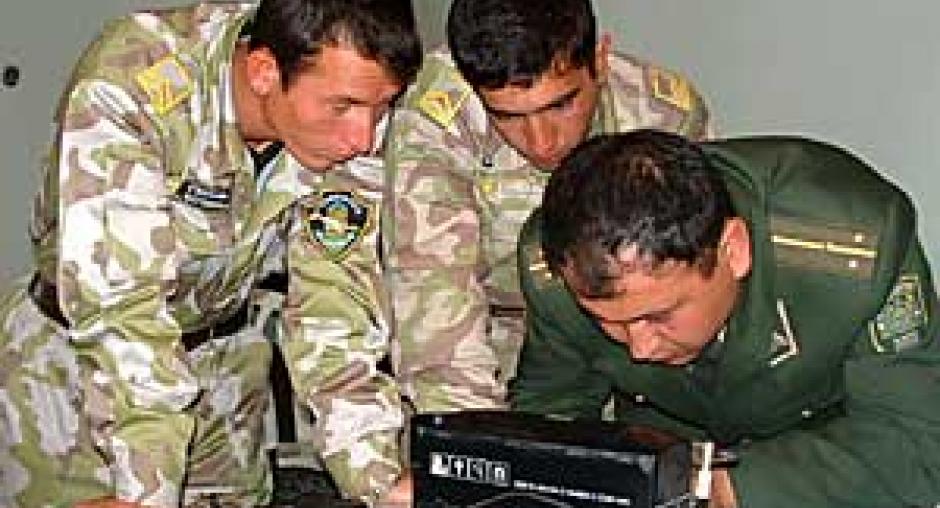Newsroom
OSCE Centre trains Uzbek border guards and custom officials on intercepting illegal guns, spotting false travel documents
TASHKENT 25 October 2004

(OSCE/Helmut Gram)Uzbek border guards and customs officials at an OSCE training course at the Uzbek-Tajik border, October 2003. (OSCE/Helmut Gram) Photo details
TASHKENT, 25 October 2004 - A training course aimed at improving Uzbekistan's border management, focusing on the problems of arms smuggling and the use of fake travel documents, was launched today by the OSCE Centre in Tashkent.
The main objective of this four-week programme is to enhance the professional abilities of mid-level border guards and customs officials. Participants will receive training in searching, tracing and seizing illegally-trafficked small arms and light weapons (SALW) in the region, as well as in examining falsified travel and customs documents.
The sessions will help to further combat illicit trafficking in SALW between Uzbekistan and neighbouring countries, and ultimately reduce the destabilizing accumulation and uncontrolled spread of these weapons in Central Asia.
The programme is also aimed at raising the law enforcers' awareness of internationally accepted rules and regulations on border management.
A team of two experienced trainers will conduct the sessions for customs officials and border guards in three regions of Uzbekistan - Nukus, Bukhara and Tashkent. In Tashkent, for the first time, Kazakh border guards and customs officials will also be participating.
These sessions will be followed by four-days of training focusing on risk assessment and risk management for high-level customs officials, conducted by the OSCE Centre's trainers, as well as by experts from the OSCE Secretariat.
This programme, the final one in a series, will end on 22 November. However, the project will enhance border management in Uzbekistan with a view to developing longer-term regional programmes for all relevant border authorities.
Previous OSCE border management training programmes in the series have included:
(1) Termez-Hayraton cross-border training programme conducted in 2002 jointly with the UN Resident Co-ordinator in Uzbekistan;
(2) Three-month Termez follow-up training course in autumn 2003;
(3) Three-week training programme in March/April 2004; and
(4) Ten-day capacity-building programme on border management in Austria in May 2004.
Background: By agreeing, in December 2000, on the OSCE Document on Small Arms and Light Weapons, the 55 participating States have introduced the world's strictest standards and measures to restrain transfers, secure stockpiles and remove weapons from circulation. The Document provides a clear mandate for assistance of this nature, in order to increase the capacity of enforcement agencies to combat illicit trafficking in SALW.
The main objective of this four-week programme is to enhance the professional abilities of mid-level border guards and customs officials. Participants will receive training in searching, tracing and seizing illegally-trafficked small arms and light weapons (SALW) in the region, as well as in examining falsified travel and customs documents.
The sessions will help to further combat illicit trafficking in SALW between Uzbekistan and neighbouring countries, and ultimately reduce the destabilizing accumulation and uncontrolled spread of these weapons in Central Asia.
The programme is also aimed at raising the law enforcers' awareness of internationally accepted rules and regulations on border management.
A team of two experienced trainers will conduct the sessions for customs officials and border guards in three regions of Uzbekistan - Nukus, Bukhara and Tashkent. In Tashkent, for the first time, Kazakh border guards and customs officials will also be participating.
These sessions will be followed by four-days of training focusing on risk assessment and risk management for high-level customs officials, conducted by the OSCE Centre's trainers, as well as by experts from the OSCE Secretariat.
This programme, the final one in a series, will end on 22 November. However, the project will enhance border management in Uzbekistan with a view to developing longer-term regional programmes for all relevant border authorities.
Previous OSCE border management training programmes in the series have included:
(1) Termez-Hayraton cross-border training programme conducted in 2002 jointly with the UN Resident Co-ordinator in Uzbekistan;
(2) Three-month Termez follow-up training course in autumn 2003;
(3) Three-week training programme in March/April 2004; and
(4) Ten-day capacity-building programme on border management in Austria in May 2004.
Background: By agreeing, in December 2000, on the OSCE Document on Small Arms and Light Weapons, the 55 participating States have introduced the world's strictest standards and measures to restrain transfers, secure stockpiles and remove weapons from circulation. The Document provides a clear mandate for assistance of this nature, in order to increase the capacity of enforcement agencies to combat illicit trafficking in SALW.
